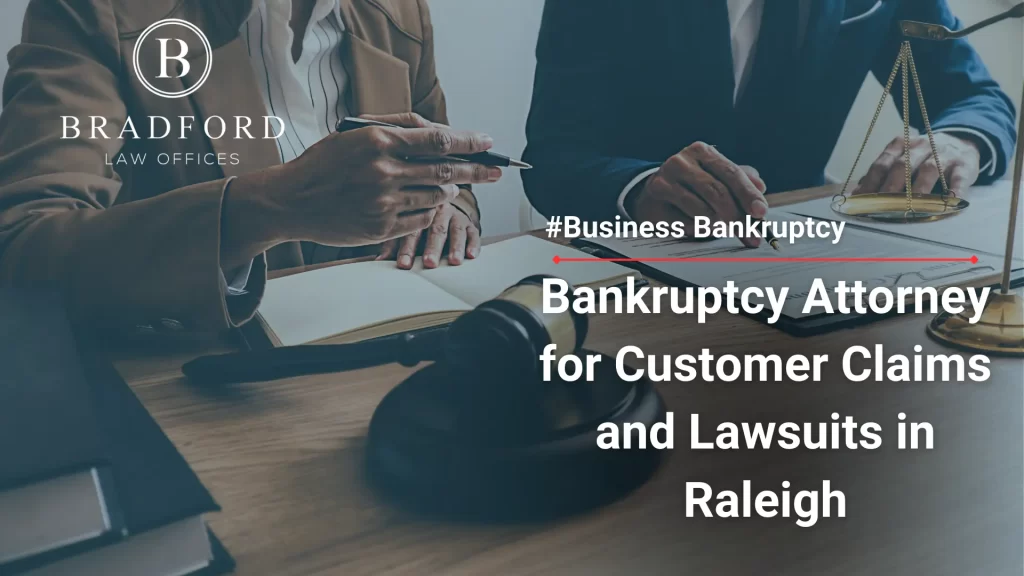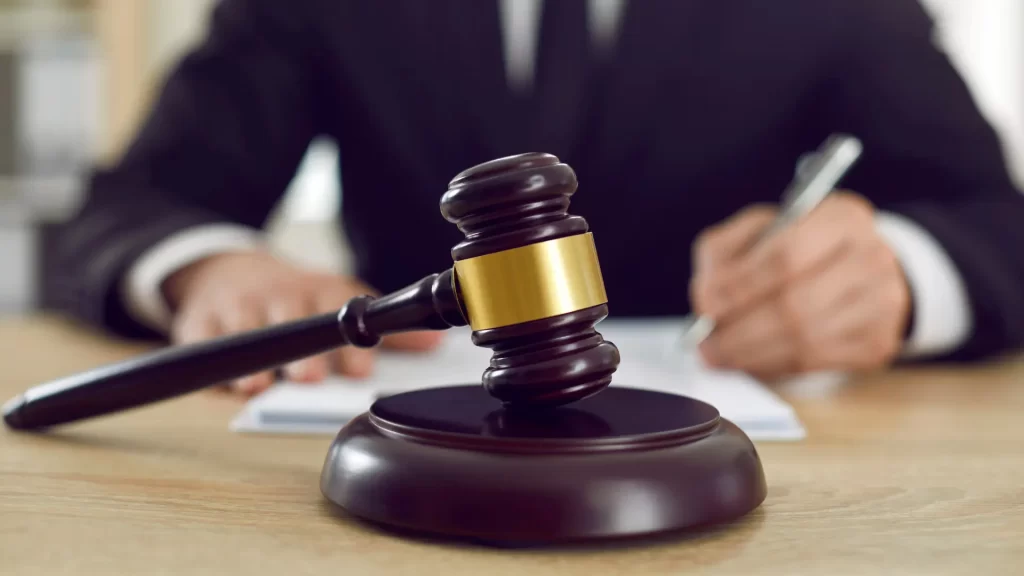
If a customer filed a claim or lawsuit against you, contact Bradford Law Offices immediately. Filing for bankruptcy might be your only solution for paying the compensation they demand. You could face lawsuits by customers if your business doesn’t provide the service or product as promised or sells defective goods.
Facing a lawsuit can put a strain on your company. You might not have the finances to cover legal fees and associated costs. Many companies struggle to meet the requirements of handling a lawsuit from an unhappy customer. Even if the customer loses their case, you could end up with expenses you can’t afford to pay.
At Bradford Law Offices, our Raleigh business bankruptcy attorney knows the implications of facing lawsuits. When a customer sues you for any reason, it can negatively affect your reputation and cause other customers to take their business elsewhere. We are ready to help you protect your company and assets and find a way to get you on the path to a better financial future.
For a confidential consultation, call us at (919) 758-8879 right now or reach out to us online.
Common Customer Claims and Lawsuits Against Businesses
People file lawsuits against companies for a range of reasons. Whether the business is responsible for causing someone’s injury or breaches a contract, various parties can pursue legal action for compensation. If you can’t afford legal fees or pay a large settlement to a customer, it becomes a burdensome situation. Filing for bankruptcy could give you the time to review your finances and determine the right solution to resolve the legal matter.
Two types of claims and lawsuits customers often file against businesses include:
- Breach of contract – When a customer hires you, they expect you to deliver on your promise. Whether implied or written, a contract is an agreement between two parties. You might sell clothing to online consumers or take on construction projects for commercial and residential properties. If the customer pays you and you fail to provide the goods or service they expect within the required timeframe, they could file a lawsuit against you.
- Product liability – Product liability is an area of law that holds a manufacturer, seller, or distributor liable for providing a consumer with a defective product. Your customer could sue your business if the product you make or sell causes an injury.
Lawsuits filed against businesses by customers are typically heard in civil court. However, you could be subject to financial penalties. If the judge enters a judgment against you, you must pay what the judge says you owe the customer.
Types of Bankruptcy Available for Customer Claims and Lawsuits
 There are multiple bankruptcy options you can choose from when facing a lawsuit by a customer. Many companies, especially small businesses, don’t have the cash on hand to settle civil cases. If you can’t afford to pay the customer, you could file for bankruptcy to protect your business and stall pending litigation while you get your finances in order.
There are multiple bankruptcy options you can choose from when facing a lawsuit by a customer. Many companies, especially small businesses, don’t have the cash on hand to settle civil cases. If you can’t afford to pay the customer, you could file for bankruptcy to protect your business and stall pending litigation while you get your finances in order.
The three primary types of bankruptcy you can file as a business owner are:
Chapter 7 Bankruptcy
Chapter 7 bankruptcy is known as liquidation bankruptcy. It’s available to various business structures, including:
- Partnerships
- Limited liability companies (LLC)
- Sole proprietorships
- Corporations
When you file for Chapter 7, you must liquidate your assets to satisfy your debt. If you face a lawsuit judgment, you might be able to wipe out the debt you owe by filing for bankruptcy.
Filing for Chapter 7 is most beneficial for companies planning to terminate operations. Selling assets you depend on to run your business could prevent you from continuing to provide goods and services. You should only pursue this type of bankruptcy if you’re ready to close the doors to your offices for good.
Once you file for Chapter 7 bankruptcy, the court will issue an automatic stay. This prevents creditors from pursuing collection actions against you for the money you owe for credit cards, loans, and other debt. More importantly, the automatic stay puts any lawsuits against you on hold.
Chapter 11 Bankruptcy
The same business structures can file for Chapter 11 bankruptcy as Chapter 7.
With Chapter 11 bankruptcy, you have a chance to reorganize your debt and submit a repayment plan. If the court already entered a lawsuit judgment against you and you can’t afford to pay, bankruptcy could give you the time you need to pay what you owe.
Filing for Chapter 11 also triggers an automatic stay like Chapter 7. You can prevent anyone from pursuing legal action against you during the ongoing period. Current lawsuits get placed on hold. Additionally, creditors are not allowed to take collection actions, such as repossessing property or garnishing wages to satisfy your debt.
Chapter 13 Bankruptcy
Chapter 13 bankruptcy is another type of reorganization bankruptcy. Individuals primarily file this type of bankruptcy. However, it’s also available to sole proprietors. You don’t qualify for Chapter 13 if you structure your business as a corporation, LLC, or partnership.
You can propose a repayment plan to the court to pay the money you owe over a period of three to five years, depending on the terms of the agreement. This allows you to avoid one lump-sum payment and restructure your debt into smaller monthly payments. You can also continue everyday operations and don’t have to sell your assets.
An automatic stay goes into effect once you file for Chapter 13. You protect your business by preventing the lawsuit from continuing, so you can create a strategy to pay off your debt.
Contact Us
If your business faces a claim or lawsuit by a customer, contact Bradford Law Offices today. We might be able to represent you in your bankruptcy case.
Since 1996, we have fought to protect business owners like you. Our legal team will protect your rights and work to secure your future. Call us right now at (919) 758-8879 for a confidential consultation.